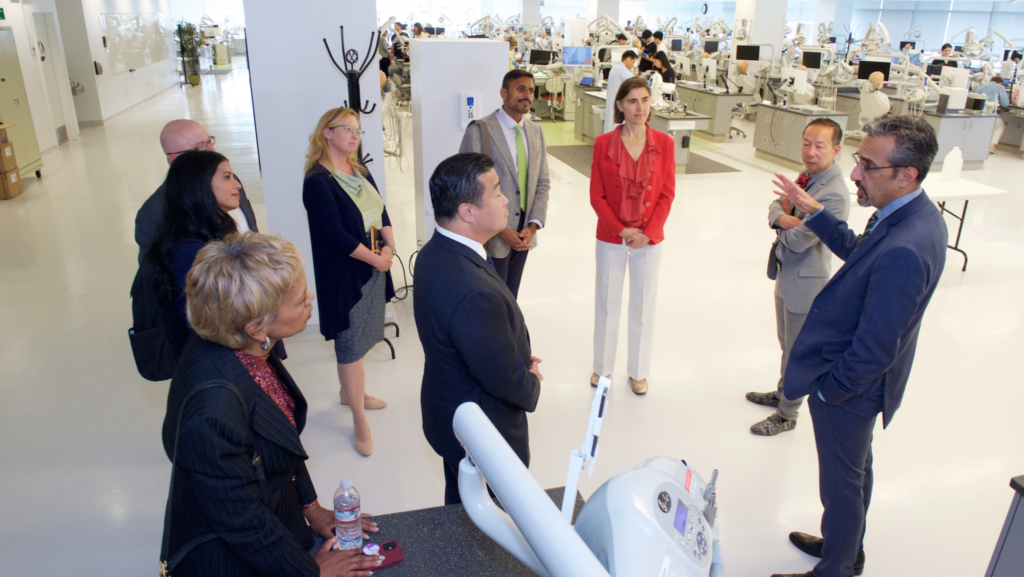Representatives from Stanford Medicine tour the clinic and simulation spaces in the Arthur A. Dugoni School of Dentistry on University of the Pacific’s Stockton Campus. (Photo: University of The Pacific)
Patients at the University of the Pacific’s Arthur A. Dugoni School of Dentistry and the School of Health Science’s Hearing and Balance Center will now have improved access to specialized care for oral health and hearing conditions, thanks to a new partnership with Stanford Medicine, according to a press release published on August 4.
As part of this collaboration, two multidisciplinary clinics will be established on Pacific’s San Francisco campus, merging expertise and resources from these two California-based institutions to provide comprehensive patient care.
What’s the Patient Journey?
At the Head and Neck Cancer Outreach Clinic, dentists will evaluate, biopsy, image, and diagnose pre-malignant and malignant oral lesions. Patients requiring advanced surgical care will be treated by specialists at Stanford Medicine. This collaboration ensures patients receive holistic care, including oral health optimization, functional rehabilitation, and maintenance, delivered by Pacific and Stanford experts working closely together throughout all phases of treatment.
“Because people usually have regular dental exams, disease can often be detected early on, before it progresses into a highly aggressive cancer that may require the removal of part of the tongue or jawbone,” said Konstantina Stankovic, chair of otolaryngology – head and neck surgery at Stanford Medicine.
“Removing an extra few millimeters of the tongue could be the difference between having understandable versus almost unintelligible speech. It’s a tremendous opportunity to detect and treat diseases early on.”
Since there is a natural link between dentistry and conditions of the ear, nose, and throat, this partnership will bridge the gap by combining Pacific’s expertise in dentistry and audiology with Stanford Medicine’s advanced diagnostic and surgical capabilities in oral cancers and ear conditions.
Expanding Access to Hearing Care
The Otology Outreach Clinic will focus on hearing conditions. Audiologists from Pacific’s Hearing and Balance Center, also located on the San Francisco campus, will screen patients for hearing disorders. Patients requiring advanced care will be referred to Stanford Medicine for procedures such as cochlear implant surgery.
“Offering audiological services through this partnership means early detection and top-tier care for hearing conditions,” said Gabriella Musacchia, associate professor and chair of the Department of Audiology at Pacific. “It’s a game-changer for patient health and an incredible learning opportunity for our students.”
Training the Next Generation
Students and residents at both Pacific and Stanford will benefit from enhanced collaborative opportunities in multidisciplinary education, research, and clinical care.
“Oral health is paramount to overall health, well-being, and quality of life,” said David K. Lam, the Dr. T. Galt and Lee DeHaven Atwood Endowed Professor, associate dean for medical integration and chair of oral and maxillofacial surgery at Pacific.
“Not only will this partnership greatly improve access to quality care for our patients, but it will also help train the next generation of clinicians and clinician-scientists to ensure optimal oral and general health outcomes,” he added.
Their $3.8M Grant
The University of the Pacific and Stanford Medicine began their partnership in 2018 with a five-year clinical education and training agreement aimed at developing new interprofessional education, clinical, and research opportunities for students. Additionally, the two schools were awarded a $3.8 million grant from the National Institutes of Health for the Pacific-Stanford PRIMED program.
So far, research studies conducted under the Pacific-Stanford PRIMED program have focused on oral cancer, sleep medicine, and the development of a biobank, a collection of medical samples used for research.
Source link

